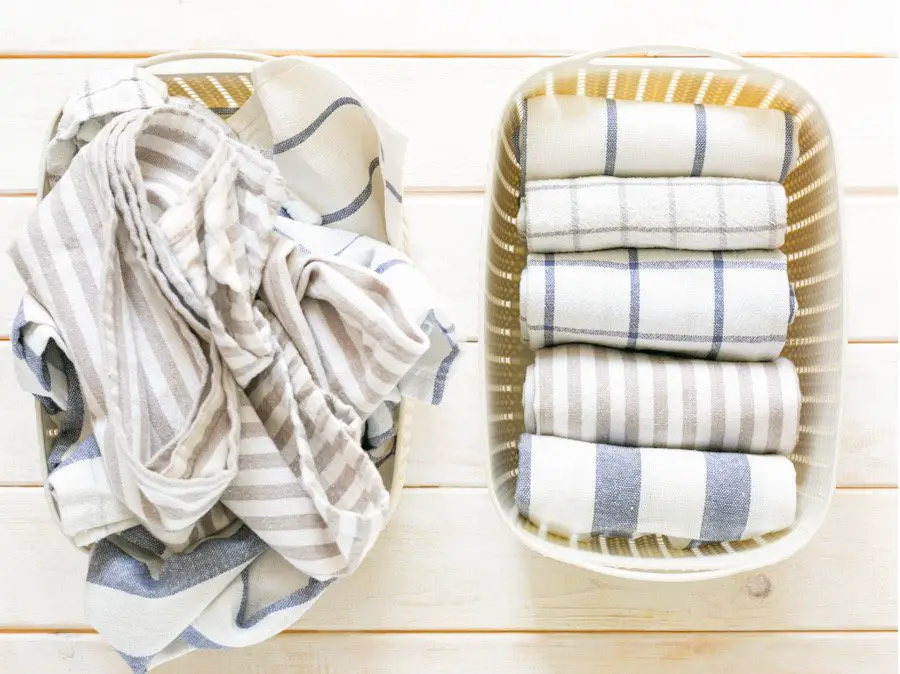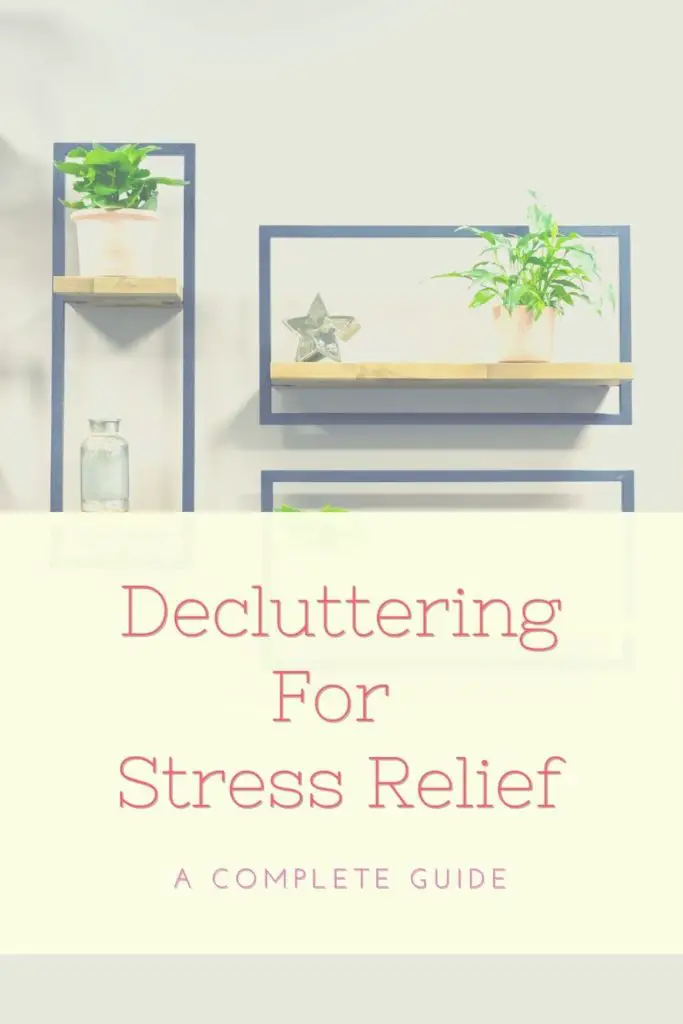It may be a new idea that you can declutter to reduce anxiety, but it’s true. Studies have shown clear links between decluttering and stress relief.
What counts as clutter will be different for everyone. This is a judgment-free space. If you are happy where you live, can find the things you need, and feel good about your home, then you don’t likely have a problem. There’s no need to concern yourself with undertaking a decluttering project.
However, if you feel ashamed to have people over, if you avoid going home because it doesn’t feel great, if you feel stressed out in your own space, or if you can never find anything you’re looking for, then you likely have a clutter problem. Don’t feel guilty about this, that will only make the stress worse. You’re in the same boat as a lot of other people. However, it’s time to make a plan to declutter to destress once and for all.
Table of Contents
How Clutter Stresses Us Out
Often, the stress we feel from physical clutter happens in the background of our minds. We may even be adjusting our behaviors without consciously recognizing it.
If you’re avoiding going home because it doesn’t feel like a good and happy space to be in, you might not naturally make the connection between “home doesn’t feel great” and “if I decluttered, there would be a sense of relief and I’d like to be there”.
A recent survey showed that one-third of people were willing to admit they avoided their own homes because they didn’t want to deal with the mess there.

Many studies have found that clutter in the home increases stress levels. This has been shown both in the responses from people surveyed and from examining MRIs and cortisol levels. Every way we have of measuring stress has shown that clutter stresses us out. It just feels heavy.
What happens when we feel stressed from clutter? We procrastinate. Studies found a clear link between procrastination and clutter. While this applies to procrastinating on actually decluttering, it goes beyond that. In a cluttered space, you may avoid having to look for something. You may also avoid having to do the next thing on a project unrelated to the clutter itself simply because your mind is overwhelmed.
Clutter, studies have found, makes it hard to be productive.
Don’t let this information overwhelm you. This is practical data you can use. Okay, clutter stresses you out. Now let’s look at the difference decluttering may make in your life.
How Decluttering Helps You Destress
There’s a common experience people have. At the beginning of the school year, students have just purchased a bunch of new school clothes and school supplies. Their backpacks are neatly packed with rulers and clean notebooks. They have freshly sharpened pencils. They’ll be wearing a new outfit to school.
And suddenly, they are looking forward to doing their homework. They can’t wait to get their first assignment.
Even if they were dreading the new school year before or nervous about going back, suddenly, the excitement is there.
While there is something to be said about these school supplies being brand new, there is also an important factor at play here. When things are uncluttered and organized, we’re happier about getting to work. While we may be more excited when there is the addition of something new, the idea of work feels less stressful when we’re in a space that feels good.

Studies have backed this up. When you are in an uncluttered space, your ability to concentrate and focus increase.
When you declutter to reduce anxiety, it can have a much wider effect on your whole life. When you feel less stressed about one thing, it can open more mental space for you to tackle other stressors. You’ve also just had the reward signal in your brain that by improving this situation, your life got better. This encourages people to do more to change their lives.
This may be why so many organizational experts have found that their clients follow up decluttering their homes with following through on their weight loss plans, stopping smoking, going for that big promotion at work, or getting out of unhealthy relationships.
With less stress, and less clutter, people open the door to new aspects of their lives.
It sounds like a bold statement, but it’s often true.
That doesn’t mean you have to follow up decluttering with changing your whole life.
Decluttering and stress relief are benefits enough. If you organize your physical space and feel freer, more productive, and less anxiety, that’s plenty of reason to declutter.
Having unnecessary things in our space causes us stress. Decluttering has been shown to make people healthier and happier.
Let’s break into how people actually do it.
How to Approach Decluttering to Destress
Some organizational experts strongly suggest breaking down your decluttering project into different spaces. So, you make a list of spaces you have to declutter and organize. This may include your purse, your car, your kitchen, your office, your backyard space, your bedroom, your living room, and the list continues. When you start breaking this into spaces as large as your kitchen and as small as your purse, this list can get long quick and possibly seem overwhelming.

Remember that decluttering to destress is a process. If you’re going to take this approach, you can prioritize by which spaces you use most often, or which ones feel the most important to you. For example, many people waste a lot of time searching through their bags to find things. Would your life be a lot happier if you managed to organize your purse once and for all? Then start there.
While many organizational experts suggest the above approach where you take it one space at a time, there are other opinions. Marie Kondo is a very famous organization expert and she strongly believes you should organize your entire life all at once. She suggests setting aside a large amount of time and dedicating that time entirely to decluttering. She says that by doing it all at once, you’ll actually do it. If you are interested in knowing more about Marie Kondo and the philosophy behind her method, check out her book ‘The Life-Changing Magic of Tidying Up: The Japanese Art of Decluttering and Organizing’ on Amazon.
Some studies link procrastination with clutter. So if you’re already suffering from stress that’s causing you to procrastinate, then that may need to affect which path you choose for yourself. That doesn’t actually mean one is necessarily better than the other.
For some people, a tendency to procrastinate is tied to their overwhelm. If they only have to face organizing their purse for now, then they’re more likely to actually do it. This completely makes sense. Then, after you’ve organized one space, the reward signaling in your brain will make it easier for you to approach other spaces.
For other people, they need to just have it done all at once. If they have to face doing small projects over time, they’ll put it off forever. If they have a week-long super project, they’ll dive in and make it happen.
What feels better to you? You’re decluttering to relieve stress. Choose the path that feels the best to you and then stick with it.
Start With a Decluttering List
All great projects start with a list, don’t they? Putting it all down on paper makes it feel more controllable. Once you have a list, you’ll know what needs to be done. You won’t need to let all those thoughts run on a loop in your mind, because you will know and trust that you’ve written it down, so you’ll take care of it soon.
Lists are powerful.
Whichever method you’ve chosen above (doing this all at once or one space at a time), your next steps are the same.
You need to make a list of what you want to declutter.

One way to approach this is space by space. To give yourself an idea of where you can start, you might look at a decluttering list that breaks down some of the objects in your home.
Now, many people may immediately start to feel anxiety. It’s common to feel like we need to have as much stuff as possible. That’s just not true, though. Studies have shown we have a lot of fear around decluttering. We fear emptiness, loss, regret. We tie a lot of emotions to our stuff, and what if it isn’t there anymore? This can make us panic.
There are two ways to help yourself get around this.
One is to pause and talk yourself through it. Remind yourself that you have the things you need. That having things you don’t need isn’t supporting you, but actually holding you back.
The second is to look at decluttering to destress as a way to add more value to the belongings you do cherish. Having things, and liking them, isn’t bad! We largely look at consumerism as a negative thing, but that’s because it can get out of control.
Your love of the quilt your grandmother made, or the favorite set of dishes you bought on your trip to Mexico, or the dress you saved up for, are all positive elements in your life.
The skinny jeans you bought but never fit into are just a depressing reminder of an old goal you maybe don’t have anymore. It’s okay to let that go. You may feel some anxiety about it, but you can push past that.
Let go of things that aren’t serving you, and better cherish the items you do have. As Marie Kondo suggests, keep the things that “spark joy” in your heart.
That may sound a bit silly, but it’s true. If your home was full of things that gave you joy, and only things that gave you joy, wouldn’t that be a better space to live in?
With that goal in mind, make your decluttering list. If you’re going to focus on the things you are keeping, it can be helpful to approach some of your list items this way.
For example, you can decide on how many coffee mugs you realistically want to have in your cupboard. Perhaps you don’t know how many are currently in there. That’s okay. On your list, you can write, “Keep eight coffee mugs”, or whatever number makes sense for your life. Then you know you need to donate all but that number of your mugs.
This gives you a clear map of what you’re going to need to do moving forward.
Where It All Goes
The next step to declutter to reduce anxiety is to decide what you’ll be doing with the things you’re removing from your life.
Get together some boxes, trash bags, and labels.
Then make a space to put things that should be sold, given away, and trashed or recycled.

While no one wants to use this last one, also make a box for “undecided” items. There will definitely be moments where you are standing with an object in your hand, stuck. Should you keep this? Do you need it? Don’t stand there for too long! This will slow down your momentum. It will also lead to you giving more time to other items as your decision-making brain slows down.
Put it in the undecided box and put a date on it. When you’re done decluttering, for now, seal the box shut and set a date on the calendar. Six months is a good timeline, but some people don’t want things sitting in the box for that long, so you may decide on a sooner date if that makes more sense to you. Then, at a later time, you can revisit the undecided box.
How To Decide on Undecided Items
When it’s time to approach the undecided box, there are some questions you can ask yourself.
Has my life been missing this object in the time it was hidden away?
If I were going to see this for the first time today, would I still buy it? This is a good way to recognize who you are now. While this object may represent who you were in your past, it may not serve your life anymore.
Would someone else appreciate this object and make good use of it if I donated it or gifted it to someone?
If somehow this item were to disappear or otherwise be destroyed, would I buy a replacement for it?

Sometimes, you’ll find an item that you really don’t want to have around in your space, but you feel strange getting rid of it for sentimental reasons. You want to hold onto the memories attached to this object. The physical presence of it serves as a reminder, and you don’t want to lose that. In this case, you may be served well by simply taking a photo or video of the object. You can keep a file on your backup drive with pictures of items you have a sentimental attachment to. This will serve as a way to bring up the memories without having to keep something in your physical space that you don’t actually want around.
Decluttering and Stress Relief Moving Forward
All right. You’ve decluttered your kitchen. It feels amazing.
But, uh oh. How is it going to stay that way?
This is a familiar feeling. It’s like when you wash all the laundry in the house after it’s been a while. You get it all put away, and then realize you are going to wear clothes and use towels again. This can be a bit disappointing at first. But then we make a plan to stay on top of the laundry and do it regularly. We create systems that automate doing laundry regularly. With that in place, the laundry doesn’t become overwhelming again.
This is how we also approach decluttering.
So how did things become so cluttered in the first place?
One way is by taking in freebies. This is a common practice you may have in your life. Anytime a friend or family member asks, “Would you like this?” you say “Yes” and figure you may find a use for it later. You don’t know yet, but you don’t want to turn down something free. It’s free, after all!
But what we’ve learned from decluttering to destress is that the objects in our space do cost us. They cost us mental space. We pay for having “free” objects in our homes with stress and a loss of productivity.
This means you need to make a “no” to freebies policy for your home. If you live with other people, the new law needs to be agreed upon by everyone involved. No more freebies.
Another way to maintain a decluttered home is by having a regular decluttering session on your calendar. This way, you can do light decluttering regularly and avoid having to do a big one later.
The frequency for everyone will be different. It may also be different for the spaces you occupy.
For some people, it may make sense to declutter their bags at the end of every workweek. Often, once a month is a good schedule for this.
Once a month is also a good length for decluttering your car. You may want to do both of these at the same time. They are spaces that tend to accumulate unwanted objects often. They’re also spaces we need to find things frequently.
Decluttering your work desk once a week is a good practice.
For your entire home? The kitchen, the bedrooms, the living room? A decluttering every six months may be efficient. This isn’t the same as regular tidying, where you go around and put things in their regular spaces. This is going through and really asking if every object in the room is still serving you. If every six months isn’t a good schedule for you, you may need to do this once every three months. That’s okay. Do what works for you and try it on your calendar.

When you put these regular decluttering sessions into your calendar, you start to automate the process. You will live in spaces that feel good to you. You will be able to trust that should they start to become a bit cluttered again, you have an event on your calendar with time scheduled out to take care of it. This means you’ll be able to trust that the project will be taken care of and your life is in order.
When you declutter to reduce anxiety and have a plan to make that a regular part of your life moving forward, it can transform your life in unexpected ways. The more you do for yourself to improve your stress levels in these small key areas, the happier and healthier your life will become.


